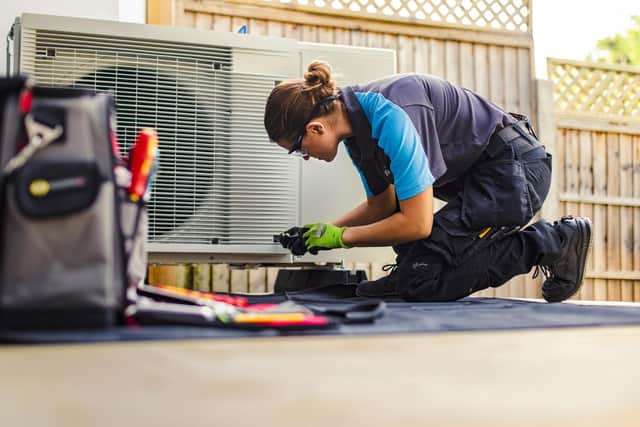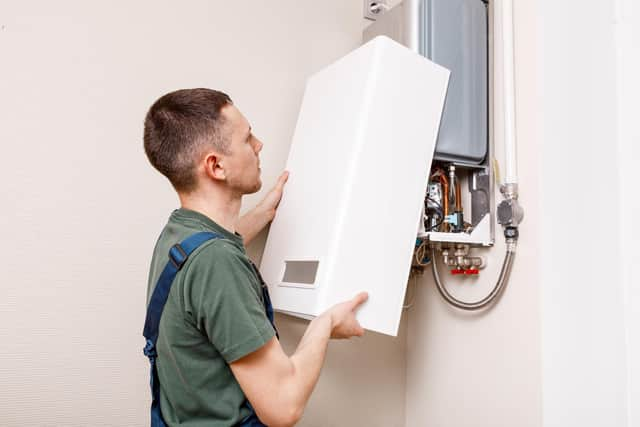Should I swap my old gas boiler for greener heat-pump? How much do heat pumps cost?
How we heat our homes has a major impact on the environment, with the residential sector responsible for around 15 per cent of Scotland’s total annual greenhouse gas emissions.
This is largely due to the extensive use of heating systems which burn fossil fuels – namely gas, but also oil, coal and LPG (liquid petroleum gas).
Advertisement
Hide AdAdvertisement
Hide AdSlashing these emissions will be an important part of achieving the aim to reach net zero emissions by 2045 in Scotland and 2050 across the UK.
Just this week Scottish ministers announced new regulations, which will ban gas boilers and other direct emissions heating systems in all new homes and non-domestic buildings constructed in Scotland from next year.
But according to official estimates, around one million existing homes in Scotland will need to switch to a zero-emissions heat supply by 2030, and the remainder – almost two million more – will need to do so within the following 15 years to hit the 2045 target.
So what does this mean for householders and when is the right time to go green?
We asked experts from the Energy Saving Trust, which manages government-funded advisory service Home Energy Scotland, and British Gas’s new business specialising in low-carbon services to explain the pros and cons, the barriers and the likely cost of upgrading your heating system.


What are the rules?
Fossil fuel systems are not actually outlawed, except in new buildings, so there is no directive forcing you to replace them with a more eco-friendly option. At least not yet.
The UK Government has set out an ambition for all traditional boilers to be replaced with low-carbon technology when they reach the end of their life from 2035 – so householders will not be required to switch until their old system needs replaced.


However, it might be wise to think ahead if you are planning to shell out for an upgrade.
Advertisement
Hide AdAdvertisement
Hide Ad“If your boiler is relatively new and still doing a good job, then there’s no reason to get rid of it just yet,” says Andrew Middleton, managing director of British Gas Zero.
“That said, it’s worth being aware of the new technology that’s coming into play as it may be easier than you think to implement it in your home.”
So what are the green options?


The primary alternative to fossil fuel systems is an electric heat pump – usually air-source, ground-source or air-to-air – a tried-and-tested technology that works a bit like a fridge, but in reverse.
“Heat pumps are suitable for almost all homes and are an extremely low-carbon heating option because they use electricity to produce heat in a highly efficient way,” says Joanna O’Loan, knowledge manager at the Energy Saving Trust.
“While not mainstream across Scotland, they are not a new technology. In fact, 65 per cent of Norway’s homes are fitted with a heat pump.”
Hydrogen, which produces water when burned, is also being explored for domestic heating, but the technology is much further behind and could not be readily rolled out.
How does an electric heat pump compare with gas on efficiency and running costs?


Heat pumps are more efficient than other heating systems because the level of heat they produce is more than the amount of electricity used.
For every unit of electricity a heat pump uses, it will supply between 2.5 and four units of heat – giving an efficiency rating of 250 to 400 per cent.
Advertisement
Hide AdAdvertisement
Hide AdIn contrast, a new condensing gas boiler should generate 0.9 units of heat for every unit of gas it uses – achieving efficiency of 90 to 95 per cent.
“For the right home,” Mr Middleton says, “heat pumps are a highly efficient and effective heating solution.”
But this might not necessarily mean cheaper bills, Ms O’Loan warns, particularly during the cost-of-living crisis.
“Although heat pumps work more efficiently than gas boilers, their running costs might not always be lower because electricity prices are currently several times higher than gas prices,” she says.
It’s hoped this may change before too long. Westminster has indicated an intention to “re-balance” electricity and gas prices.
How much would it cost to install a heat pump system?
You should expect to pay from around £7,000 to £13,000 for an air-source system, but the final bill will depend on the capacity of the pump, the size of your house and any changes required – such as upgrading radiators.
In comparison, a new gas boiler will typically cost £2,000 to £5,000 – again depending on the scale of your home and what else needs replaced.
Are some homes not suitable for green tech?
The age and style of your property may pose a few challenges when it comes to energy-efficiency, but that doesn’t rule out a heat pump.
Advertisement
Hide AdAdvertisement
Hide AdHeat pumps can be installed in just about any property type, according to the Energy Saving Trust, even in older buildings that are considered harder to heat.
Mr Middleton adds: “The reality is that the majority of people in the UK don’t live in newly-built efficient homes, but retrofit improvements can help to make your home more energy-efficient.”
British Gas offers a Home Health Check, involving a thorough investigation of your home that includes thermal imagery to show where heat escapes.
So what else can be done to reduce power use and help tackle climate change?
Mr Middleton advises: “When thinking about reducing your energy bills and the carbon emissions from your home, it is worth considering the wide range of steps you can take, including installing insulation, solar panels and smart heating controls.”
Ms O’Loan agrees, saying: “Draught-proofing and insulating your home well are both worth doing, whatever type of heating system you have.”
Comments
Want to join the conversation? Please or to comment on this article.